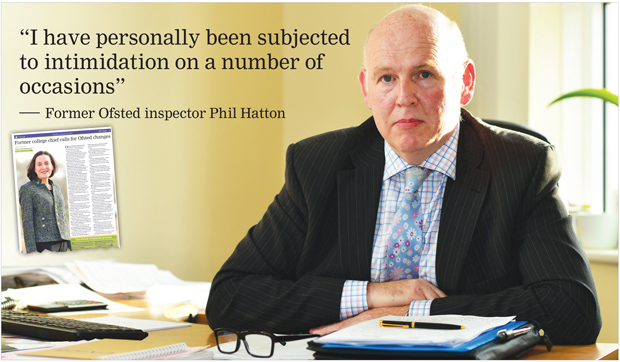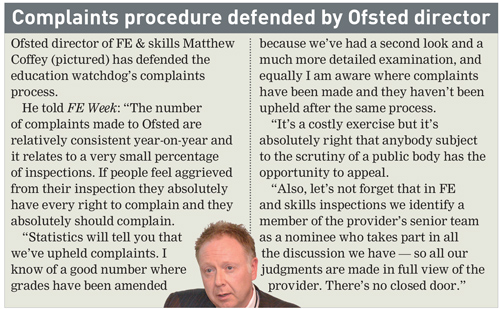
It’s one thing being inspected by Ofsted — and feeling aggrieved by the process or outcome — but it’s another thing to be carrying out the inspection and potentially exposing managing directors and principals to the ugly truth about their organisations.
Here, just weeks after ex-Newcastle College Group chief executive Dame Jackie Fisher revealed why she had thrown Ofsted out mid-inspection back in 2012 (pictured inset), former inspector Phil Hatton speaks to FE Week about his experience from the other side of the fence.
The debate about complaints against Ofsted has prompted discussions about the current process in the sector.
Over the past year, since I gave up being a full-time inspector, I have worked with a wide selection of providers and colleges and have spoken with many more at conferences.
There is a very definite feeling among them that the appeals procedure is heavily loaded one way and that complaining about any aspect of inspection would be ‘a waste of time’.
This is a sad reflection of how the inspection process is currently viewed by those subject to it.
‘Iron Fist’
Of the four inspectorates I worked for in 20 years as an inspector, the one that was probably viewed best by the sector was the Adult Learning Inspectorate (ALI).
Before being merged into Ofsted, an independent review of inspectorates described the ALI as being viewed by the sector as ‘an iron fist in a velvet glove’.
Communication with the sector was particularly strong, with the monthly newsletter, Talisman, being eagerly read.
Full-time inspectors met to share findings frequently and part-time inspectors worked for the inspectorate rather than a third party, with their performance and development being closely monitored.
Part of the quality assurance of complaints in the ALI was for myself and another inspector to review and analyse the reasons for all the complaints that arose in a particular year.
Over the two years I did this it was extremely rare for any to get to the stage of judicial review.
The ALI, just like any really good provider, learned from what had gone wrong to prevent reoccurrence.
That should be the raison d’être for any complaints system if the culture of an organisation is really about improvement, rather than paying it lip service.
Communication breakdown
One of the forgotten quality assurance methods when I was a part-time inspector for the Further Education Funding Council was for college nominees to be able to sit in on observations with inspectors.
This meant that nominees developed confidence in judgements made about teaching and learning, with real transparency of the process as viewed by colleges at the time.
In my experience complaints arise when there are breakdowns in communication.
As a lead inspector, both you and the provider nominee want to ensure that an inspection runs smoothly, so that your team of inspectors get to see every positive attribute of the provider.
This was always my very clear message when first talking to a provider, ‘show us everything that you do well’ before we reach the grading meeting.
My experienced colleagues that I have worked with over the years have that same attitude, so that if there is a close call between two grades we would be questioning to see if there were any positives that had been missed or which had not been given sufficient weighting.
Conflict
The role of the nominee is absolutely crucial in preventing potential conflict.
Any provider, whether one with 20 or 40,000 learners, needs to ensure that communication during inspection throws up that potential conflict quickly.
Over the years I have had to deal with inspectors whose personality was such that they came across as too cold and unfriendly, or whose grasp of the area they were inspecting was just not good enough.
Along with this, there were occasionally those who were of the glass being half-empty rather than half-full variety.
In such cases the lead inspector or their assist would usually observe the inspector where such concerns were raised, and look at their evidence base to check the validity of judgements and the understanding of what was being observed or spoken about.
This usually worked very well, with feedback to the inspector ironing out the difficulties. In such cases, with honest two-way communication with the nominee, the outcome of inspection was not impacted on.
Where there are unresolved problems it is usually down to clashes of personality. That can be a two-way street, with elements of blame on both sides.
Intimidation
Speaking with total frankness and honesty, there are some providers (or usually a particular individual) whose point-blank refusal to understand why they are less than perfect cannot be shaken, despite the evidence being irrefutable as to why they are not.
Truly outstanding providers will say ‘but is there anything else that we could improve?’
I have personally been subjected to intimidation on a number of occasions. In one particular case an external observer on the inspection wondered why there was no punitive action for a provider who tried to make the inspection very difficult to carry out.
The complaints process was crystal clear to all in the ALI and any action that was needed was rapidly taken.
An inspection manager, unconnected with the problematic inspection and knowledgeable about the area being inspected, would quickly visit a complaining provider to hear their side of the story, alongside reviewing the complete evidence base for the inspection. This worked well in the vast majority of cases, with a two-way dialogue. Providers felt listened to and that the complaints process was transparent and fair.
The timings of the current Ofsted complaints system need to be aligned with the report publication schedule (five weeks to publish, six to deal with complaints?).
The fact it exceeds the publication schedule sends the wrong message and does not demonstrate joined up thinking if you are really wanting to engage positively with the sector, rather than to give the impression of a hard-nosed ‘publish or be damned’ organisation.
Mistakes
It is an obvious fact that anyone can make a mistake. An acknowledgement of this when one is made would prevent some complaints reaching the latter stages.
Communication will most likely be good when inspectors know the areas that they are inspecting well and they can demonstrate a record of high achievement in them to those that they are inspecting. This cuts out the ‘who are you to be telling me what to do’ element of potential conflict.
By the end of August a record year for the number of Learning and Skills inspections carried out will have ended, many led by recently-recruited inspectors.
The Freedom of Informaton request by FE Week does point to failings in the process of inspection in the last academic year, with nine step two complaints by providers being upheld (over one-third of those reached).
What is even more worrying is the 100 per cent rate quoted so far for this academic year, with all four complaints having been upheld.
Hopefully, the need to ramp up quality assurance of inspections in the field will be recognised and will impact quickly to prevent mistrust. I know that inspection can be a truly valuable improvement process for the sector.
Phil Hatton is a former HMI with 20 years’ experience, leading hundreds of college and work-based learning inspections. He now works at the Learning Improvement Service — www.learningimprovementservice.co.uk — as an adviser.









Having been an ALI and Ofsted additional inspector there is a world of difference between the approach of both inspectorates and lead inspectors towards the people they inspect. I have stopped inspecting in colleges this year because of the way they are run by some of the newer HMIs. I remember attending a training day for inspectors run by Phil for about 30 of us which really helped improve the consistency of what we were doing as part time ALI inspectors. There has been nothing similar in several years and the cracks in consistency of inspections are really showing. The comments made by Matthew Coffey are typical of the civil service. Yes we have made mistakes but when we did so the provider was party to them??? Having a consistent number of mistakes is nothing for anyone to be proud of. If Ofsted were a college or provider they would be at least requires improvement for that complacent kind of attitude.
I know that the inspectors are between a rock and a hard place when it comes to complaints, but Matthew Coffey really should have thought again before saying: “I know of a good number where grades have been amended because we’ve had a second look and a much more detailed examination…” This is tantamount to admitting that Ofsted fails to carry out detailed enough examination in the first place. A very unwise admission. Also, to admit the number of complaints made is “relatively consistent year-on-year” suggests they haven’t learned from their mistakes. Were a school, college or provider to admit the same, they would soon find themselves in special measures.